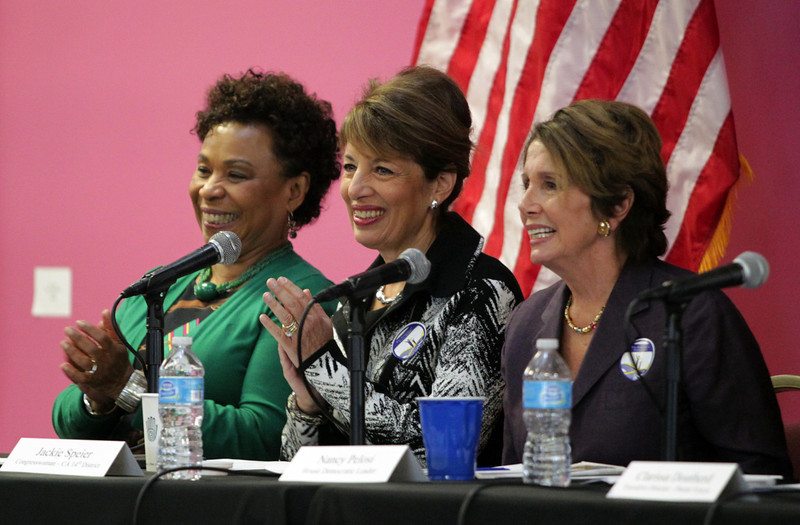By Josh Richman
The Oakland Tribune
With November’s midterm elections looking dicey, Democrats are touting their effort to improve the economy by providing equal protections and new opportunities for working women — one of the party’s most loyal voting blocs.
“This is a time when we have a need, an urgency and an opportunity to change the environment in which we can enable women to succeed,” House Democratic Leader Nancy Pelosi said at an event Tuesday touting her party’s “When Women Succeed, America Succeeds” agenda.
Pelosi, D-San Francisco, was joined by Reps. Barbara Lee, D-Oakland, and Jackie Speier, D-San Mateo, before a crowd of about 150 at the African American Arts & Cultural Complex in the city’s Western Addition neighborhood.
Half a century after President John F. Kennedy signed the Equal Pay Act, women still make only 77 cents for every dollar earned by men, amounting to an annual gap of $11,084, the Democrats point out.
And that, they say, is enough to buy 89 weeks of food or more than 3,000 gallons of gas — or pay more than a year of rent.
It’s worse for women of color: African-American women on average earn only 64 cents, and Latinas on average earn only 55 cents for every dollar earned by white men. And almost two-thirds of minimum-wage workers are women.
The Democrats’ agenda includes raising the minimum wage, investing more in job training and education, providing more support for women entrepreneurs and small-business owners, achieving fairness for pregnant workers and cracking down on wage discrimination.
They also want new laws ensuring paid sick leave as well as paid and expanded family and medical leave.
Nearly two-thirds of American women with preschool-age children work, yet American families generally must fend for themselves in finding child care, while full-time child care costs from $4,000 to $12,000 per year depending on the state.
“When I lost my child care subsidy due to state budget cuts, my entire life quickly unraveled,” said Clarissa Doutherd, executive director of Parent Voices Oakland and one of several speakers who shared personal stories at Tuesday’s event. “I could no longer afford to work.”
So the House Democrats support President Barack Obama’s Preschool and Early Head Start child care initiative, but also call for other funding for affordable and high-quality child care, including adequate pay and training for child care workers.
They also want to expand and make permanent the child care tax credit.
“This is our moment; it is time for each and every one of us to recognize it is not going to happen unless we make it happen,” Speier said Tuesday, citing the slogan on her favorite T-shirt: “Polite women do not make history.”
Pelosi said she’d rather see bills passed than see the gender-gap issue used as a voter-mobilization tool in November.
“This is bigger than politics, bigger than elections,” she said. “This is about what our country is.”
But it could be potent politics, too.
Women favored Obama over 2012 GOP nominee Mitt Romney by 17 percentage points, according to the Pew Research Center for the People and the Press.
Many remember Romney’s awkward debate moment when, asked about pay equity, he spoke about “binders full of women” he had considered for cabinet posts while serving as Massachusetts’ governor.
Romney notwithstanding, women voters have broken toward Democrats since the early 1980s, according to the Center for the American Woman and Politics at Rutgers University.
In recent years, Democrats have accused the GOP of waging a “war on women,” both on economic issues and reproductive choice.
American Principles in Action, a conservative nonprofit, announced Tuesday that the Republican National Committee this week will consider a resolution that challenges such rhetoric by opposing a “strategy of silence” on abortion.
“Staying silent fails because this strategy allows Democrats to define the Republican brand and prevents the Republican Party from taking advantage of widely supported pro-life positions … to attract traditional and new values voters,” the resolution reads.
Last May, Gallup found 47 percent of U.S. women consider themselves “pro-choice,” while 46 percent consider themselves “pro-life.”
So, Democrats might find it easier to connect with a wider spectrum of women voters on economic issues.
“Democratic congressmen are holding meetings like this around the country,” Speier said Tuesday, “while Republican congressmen are reading memos about how to talk to women.”
www.insidebayarea.com














































































































































































































































































































































































